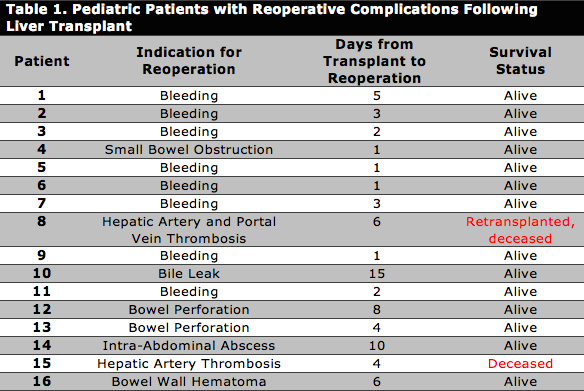Complications Requiring Reoperation After Pediatric Liver Transplantation.
Department of Surgery, Baylor College of Medicine, Houston, TX
Meeting: 2017 American Transplant Congress
Abstract number: B211
Keywords: Graft survival, Post-operative complications, Survival
Session Information
Session Name: Poster Session B: Liver Retransplantation and Other Complications
Session Type: Poster Session
Date: Sunday, April 30, 2017
Session Time: 6:00pm-7:00pm
 Presentation Time: 6:00pm-7:00pm
Presentation Time: 6:00pm-7:00pm
Location: Hall D1
Context: Reoperative complications after liver transplantation have been shown to decrease patient and graft survival in adults; this effect, however, has not been studied in the pediatric population.
Purpose: To investigate the impact of reoperative complications following pediatric liver transplantation on patient and graft survival.
Methods: All patients < 18 years of age that underwent their first liver transplant at our institution during January 1, 2012 – October 18, 2016 were included in this study. Reoperative complication was defined as any complication related to the liver transplantation requiring laparotomy within 30 days of transplant or within the same hospital admission, excluding retransplantation. For patients with multiple reoperations, only the first reoperative complication was counted. Survival of patients with and without reoperative complications was compared using a log-rank test, with p < 0.05 defined as significant.
Results: A total of 153 patients underwent a first liver transplant at our institution during the study period. The median follow-up period was 2.2 years, with a range of 5 days to 4.8 years. 16 (10%) patients had reoperative complications (table 1). 15 patients required a single reoperation, while 1 patient required 10 reoperations. The most common indication for reoperation was bleeding (8 of 16). Median time from transplant to reoperation was 4 (1 – 21) days. There were 2 (12.5%) deaths and 2 (12.5%) graft losses out of 16 patients with reoperative complications, compared to 11 deaths (8.0%) and 15 graft losses (10.9%) out of 137 patients with no reoperative complications. A log-rank comparison found no significant difference in patient survival (p = 0.5) or graft survival (p = 0.8) between the two groups.
Conclusion: The most common reason for reoperation following pediatric liver transplantation is bleeding, while vascular and biliary indications are much less common. This study did not reveal a significant impact of reoperation on patient or graft survival.
CITATION INFORMATION: Yoeli D, Moffett J, Hosek K, Ackah R, Sigireddi R, Kueht M, Galvan N, Cotton R, Rana A, O'Mahony C, Goss J. Complications Requiring Reoperation After Pediatric Liver Transplantation. Am J Transplant. 2017;17 (suppl 3).
To cite this abstract in AMA style:
Yoeli D, Moffett J, Hosek K, Ackah R, Sigireddi R, Kueht M, Galvan N, Cotton R, Rana A, O'Mahony C, Goss J. Complications Requiring Reoperation After Pediatric Liver Transplantation. [abstract]. Am J Transplant. 2017; 17 (suppl 3). https://atcmeetingabstracts.com/abstract/complications-requiring-reoperation-after-pediatric-liver-transplantation/. Accessed February 27, 2026.« Back to 2017 American Transplant Congress
